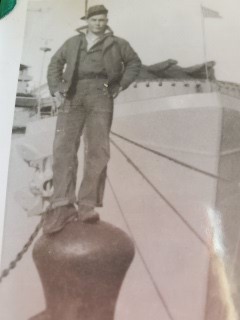How I learned about cisterns
The house on the farm in Missouri where we moved to was a big white farm house with 2 stories, and big porches on both sides. It sat on the crest of a hill about a quarter mile from the gate to our property. On the downhill side of the house, off the kitchen, a large covered porch was built on top of the smoke house. The smokehouse was added on to the foundation of the house by some former inhabitant. This was used to preserve meat before refrigeration. From the porch you could see anyone coming down the hill. Mind you this is in the foothills of southern Missouri where you are hard pressed to find any land that is flat. We did have some bottom land that ran along each side of the creek that flowed through the property. You had to go from the gate on the top of one hill down to the creek and then up the other side to the house. We walked this everyday going to and from school, to the pastures to get the cows for milking, to the woods to help dad get wood for the stoves, and many other reasons to numerous to mention.
On the uphill side of the house: as we called it, just outside of the back door was an old cistern. What is a cistern you ask? It is a large hole dug into the ground, lined with rock, to catch rain water. At this time we didn’t have running water or electricity in the house. Dad later ran lines for water and electricity from the milk barn down to the house, but to start with we carried drinking water. Mom decided one day that the rain water was being wasted running down the hill. So dad decided to fix the old cistern. Now mind you this old well like structure was 15 feet deep, at least 6 feet in diameter and had not been used for years. When he pried the top off and we could see down into this deep dark whole, we couldn’t see the bottom it was so dark. There wasn’t any water in it, so that meant it was cracked somewhere so that it wouldn’t hold water any more.
So the plan was that my brother and I; I was 11 he was 10, would go down in this whole, clean out the junk of no telling how many years, then scrub it clean so dad could reseal it to hold water again. Great plan, but for me it was not the best idea; my brother was all for it. There were some caves on the farm that became their favorite play places. I had to overcome going into a dark cave to see what was there. I was quite happy to stay in the light. But as dad said we sometimes have to look into the dark to see where light is needed.
First dad got a long rope tied a weight on one end and dropped it down into the whole. This way he determined how deep it was. Then he got his long extension ladder and put it down in the whole. He went down first with a lantern to see if it was safe for us to go down. When a light was taken to the bottom we could see how much junk had collected over the years. This became an almost daily confrontation for me. I won’t go into what we found down there but for a girl from the city it was a courage building experience. Even with a rope and bucket to haul the stuff from the bottom to the top and then scrubbing the sides it took a several weeks to get it to a point dad could start sealing the cracks. At least it was cool down there; being underground, the walls and bottom lined with rock from the creek, and mortar between the rocks to make it hold water.
After we got our part done dad started caulking around the rocks and coating the bottom and part way up the sides with cement. He fixed the top so kids or animals couldn’t fall down into it. Then he fixed the down spouts on the house so when it rained the water would run into the cistern. We had a long tin tube about 3 feet long and 4 inches across, with one end closed off and a handle on the other end. We could let this down into the cistern on a rope; then bring up water to be used for washing clothes and people. The water stayed clean and mom loved to wash our clothes and hair in it.
We are taught in the bible to stay filled with the spirit but if we let cracks form in our heart we can become like a broken cistern, empty, dark and unusable. If our souls are cracked and dark we collect junk that needs to be cleaned out. When we make Jesus the Lord of our life He can clean out the junk that has collected in us and bring in the light. He will fix the cracks and fill us with his spirit so our light can shine to a needy world. We are to be reservoirs of the word to spill out to others. Is your life a broken cistern or a full reservoir of the word? Jesus is the only answer to any crack in the cistern of your heart. Ask him to fix your life and fill you up, you will be glad you did.
John 3:16.
If this has touched you let me know by leaving a comment, and your email I will get back to you.
JESUS IS THE ANSWER
